
Getting through Amazon's The Rings of Power for the memes
When its first episode aired on September 1, 2022, The Lord of The Rings: The Rings of Power became "the biggest debute" in Amazon Prime Video's history, attracting more than 25 million viewers in a single day (Flint, 2022). Despite the Amazon series' impressive viewership, the response of its audience was not overly enthusiastic. According to various media, the series was even "review bombed" by angry Lord of The Rings fans (Tassi, 2022). The inundation of indignant reactions caused Amazon to interfere with the series' reviews on IMDb (Shcherban, 2022) — an online service that, like Prime Video, is owned by Amazon — and suspend reviews for the series on Amazon.com (Piazza, 2022). Amazon's actions, however, could not prevent people from sharing their feelings about the 715 million dollar prequel on various other online platforms. Considering the variety of these reactions, this article takes a closer look at some of the memes that were produced in response to the first few episodes of the series, and examines what these memes might demonstrate about the perceived connection between Big Tech and the industry's appropriation and transformation of popular culture products like Tolkien's The Lord of the Rings.
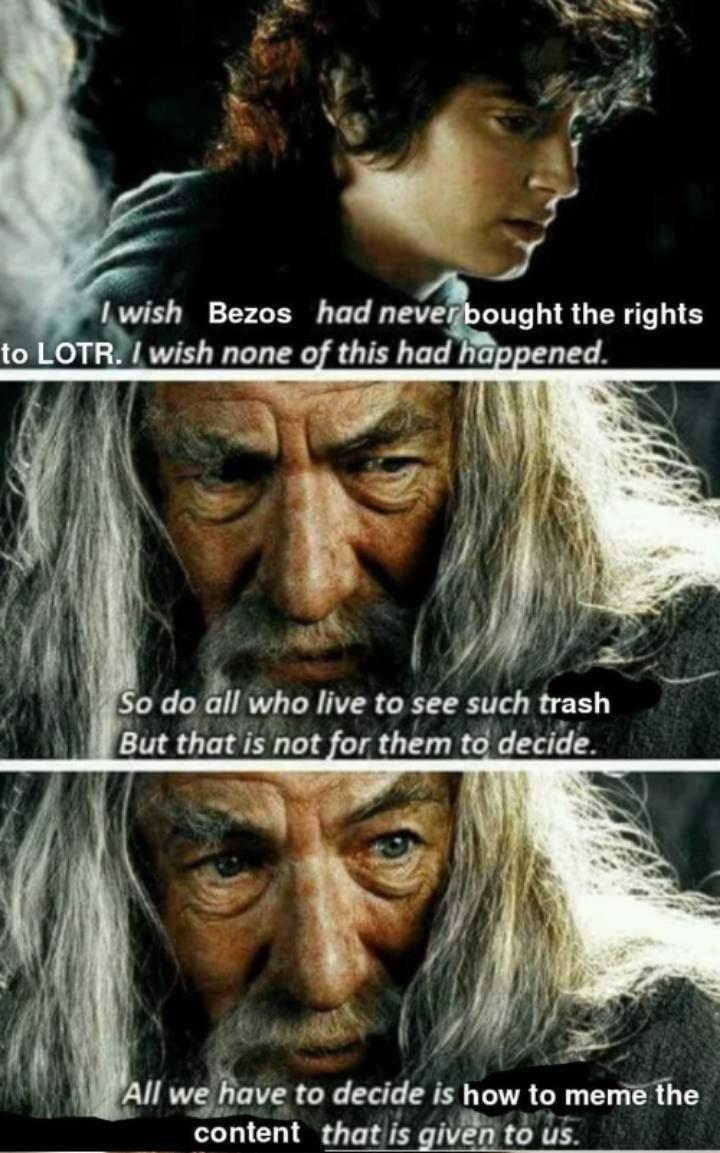
Figure 1: An example of a meme that describes The Lord of the Rings: The Rings of Power as "trash" and links this opinion to Bezos' ownership of "LOTR".
Big Tech's love for The Lord of the Rings
It has been public knowledge for some time that many individuals in the American tech industry have warm feelings towards The Lord of the Rings; a series of books that was published in the United Kingdom in the 1950s and is seen as foundational for the 'high fantasy' genre. The books provide the people who work for major tech companies with a common language and metaphors they can use to grasp their professional lives (Rodriguez, 2020). Facebook CEO Mark Zuckerberg, for instance, has acknowledged that his employees sometimes refer to him as the "Eye of Sauron" (Bove, 2022) — a nickname he takes as a compliment, despite the fact that Sauron is the main villain of the story. Others perceive The Lord of the Rings as some type of grant inspiration and identify with its characters. Parallels are drawn between tech entrepreneurs and the protagonist hobbits, who are seen as small and forced to rely on themselves, and as emerging victoriously despite various struggles and hardships. Following this line of interpretation, The Lord of the Rings appears to become aligned with the American Dream, according to which even the most unlikely individuals are able to succeed through "sacrifice, risk-taking, and hard work" (Barone, 2022).
Facebook CEO Mark Zuckerberg, for instance, has acknowledged that his employees sometimes refer to him as the "Eye of Sauron".
The most famous Lord of the Rings fan in the American tech industry, however, is probably PayPal co-founder and Facebook investor Peter Thiel, who has been described as "obsess[ing]" over "the books" (Chafkin, 2021). This obsession might be reflected by the fact that Thiel has named at least five companies after the high fantasy fiction (Wexner, 2018). The most prominent of these is Palantir Technologies, which focuses on Big Data analysis. The word 'Palantir' refers to a crystal ball that can be used to observe events in different locations and times. In The Lord of the Rings, Palantirs are used by both heroes and antagonists, including Sauron. And Thiel is no exception. Former Facebook employee Palmer Luckey now heads Anduril Industries, a company that specializes in defense technology. In The Lord of the Rings, 'Anduril' is the name of a mythical sword that symbolizes the greatness of mankind and their historic campaign against Sauron. All in all, these examples should demonstrate how Silicon Valley and Middle-earth — the fictional location of The Lord of the Rings — are deeply intertwined.
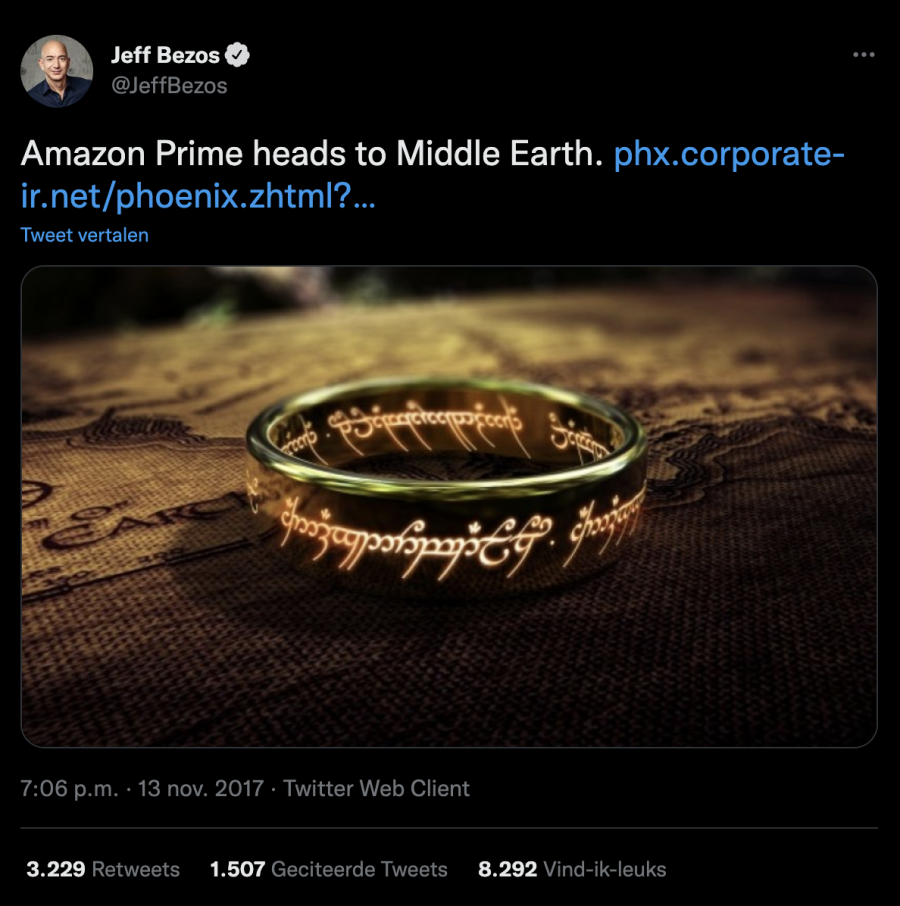
Figure 2: A screenshot showing Bezos' tweet about heading to "Middle Earth" — a misspelling, since the name of the fictional continent is normally spelled "Middle-earth".
Buying The Lord of the Rings, sort of
Considering their love for The Lord of the Rings and their massive financial resources, it was probably only a matter of time before one of Big Tech's Lord of the Rings fans would attempt to buy the story. On November 13, 2017, Amazon CEO Jeff Bezos announced that "Amazon Prime heads to Middle Earth" after Amazon paid 250 million dollars "for the rights to produce TV programs based on J.R.R. Tolkien's Lord of the Rings fantasy novels" (Cain, 2017). The words "based on" are of great significance here; Amazon did not acquire full control over Tolkien's work. According to the creators of The Rings of Power, Amazon does "not have the rights to The Silmarillion, Unfinished Tales, The History of Middle-earth, or any of those other books" (Robinson, 2022). This entails that, for the creation of their new Lord of the Rings series, they had to balance between drawing from the content they were allowed to use while simultaneously circumventing the stories and concepts that remained beyond their reach (Lyon, 2022).
The fact that the creators had to 'get creative' with the popular fantasy novels, however, does not appear to be the dominant reason for the fan's backlash. Various media have highlighted the racism that is embedded in the negative responses (Hetzner, 2022; Heritage, 2022). Fans have, for instance, reacted badly to the casting of black actors for parts that are, according to them, inherently 'white'. Though this is probably the most attention-grabbing criticism on the series, it's by no means to only perspective that is present in the fans' scrutiny. Others are upset because parts of Amazon's creation are, according to them, not true to Tolkien's vision for improper reasons. They, for instance, denounce the fact that the dwarf princess that plays a prominent role in the series does not have a beard, accusing its creators of valuing aesthetics over content (Cameron, 2022; Lang, 2022). Furthermore, there are fans that object to the series and Amazon's control over The Lord of the Rings in their entirety, as they believe that Amazon and Jeff Bezos are merely in it for the money, and no good will come of the tech companies' partial ownership of what they see as an important piece of cultural heritage.
How to meme the "trash" that is given to us
All memes with at least 2 or 3 likes that were posted on Twitter between September 1, 2022 and September 21, 2022 about The Lord of The Rings: The Rings of Power were categorized and analyzed. According to media scholar Limor Shifman: "While one might expect that in the absence of formal gatekeeping people would create an endless array of meme types, in reality, participants tend to mold their memetic contributions according to a surprisingly small number of formulations." (Shifman, 2014, p. 342) In this particular case, Shifman's argument appears to be confirmed by the observation that many of the memes fit the so called 'comparison meme'-genre. Rather than coming up with innovative or creative techniques and methods to voice their opinion about the series' quality, people juxtapose standard images of 'high quality' art and 'low quality' art to communicate that The Rings of Power is less 'good' than the cultural products it is based upon.
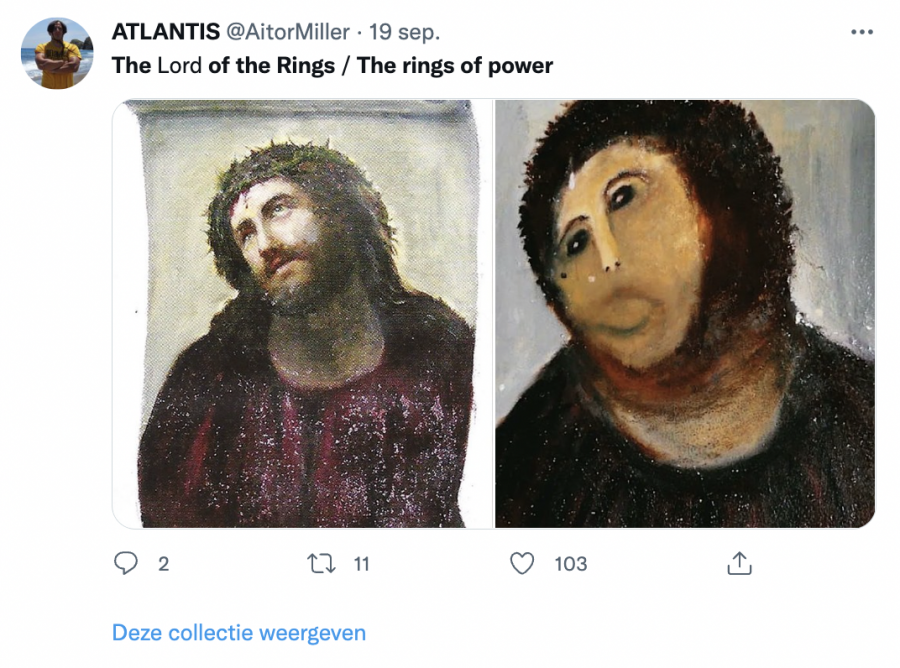
Figure 3: A so called 'comparison meme' is used to communicate something about the general quality of The Rings of Power.
Often, familiar comparison memes were merely resemiotized through the addition of written texts. In Figure 3, the 'potato Jesus' meme is linked to The Rings of Power, thereby providing "memic-intertextual recognisability" (Varis & Blommaert, 2018) and mapping some of the qualities of the original 'potato Jesus' story unto the Amazon series. 'Potato Jesus' was" born when an amateur painter wanted to restore a fresco of Jesus, but instead "botched" the painting (LeCalum, 2022). In this sense, notions of 'amateurism' and 'ruination' are transmitted to The Rings of Power through the re-use of this specific meme. Thus, the meme does not merely communicate something about the series, but also about the competence of its creators.
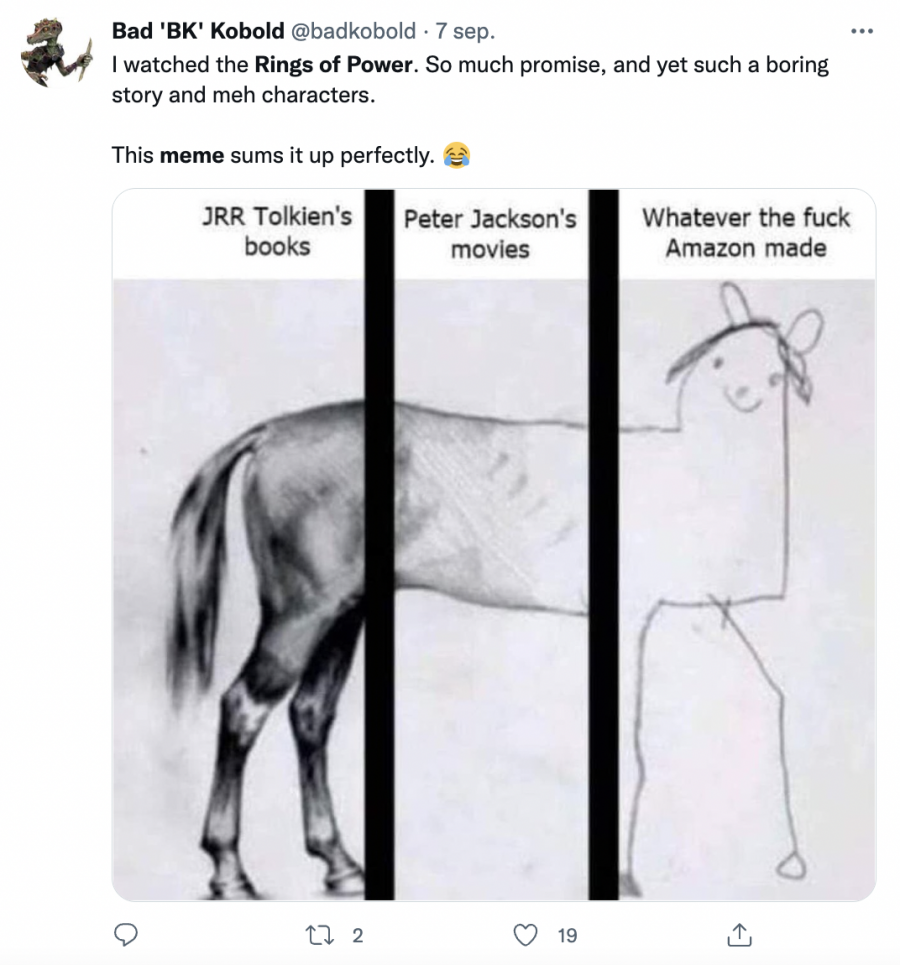
Figure 4: An image that merges three different drawings of the same horse compares Tolkien's version of The Lord of the Rings with Peter Jackson's and Prime Video's work.
Though different comparison memes might appear relatively similar and straightforward, there are interesting varations among them, specifically when it comes to demonstrating a lower or higher 'rank' within the fan community of The Lord of the Rings (Blommaert & Varis, 2011). Whereas Figure 3 merely demonstrates the ability to compare the Amazon series to some typ of general "The Lord of the Rings", Figure 4 appears to contradict the existence of a general "The Lord of the Rings" and concretizes this umbrella category by differentiating between "JRR Tolkien's books" and "Peter Jackson's movies". Through this action, the meme's creator identifies as an 'expert'; having not only seen Peter Jackson's film adaptations of the Tolkien novels, but also having read the original books — which are, according to this meme, the only true works of art; an observation that can only be made by those who have extensive knowledge of both Tolkien's and Jackson's work.
Competing against House of the Dragon
The Lord of The Rings: The Rings of Power was not the only high fantasy prequel that was released at the end of the summer of 2022. On August 21, 2022, the first episode of House of the Dragon aired on HBO Max, one of Prime Video's biggest competitors. With less than two weeks between the two releases, and overlapping audiences and thematic features, connections between both series were easily drawn.
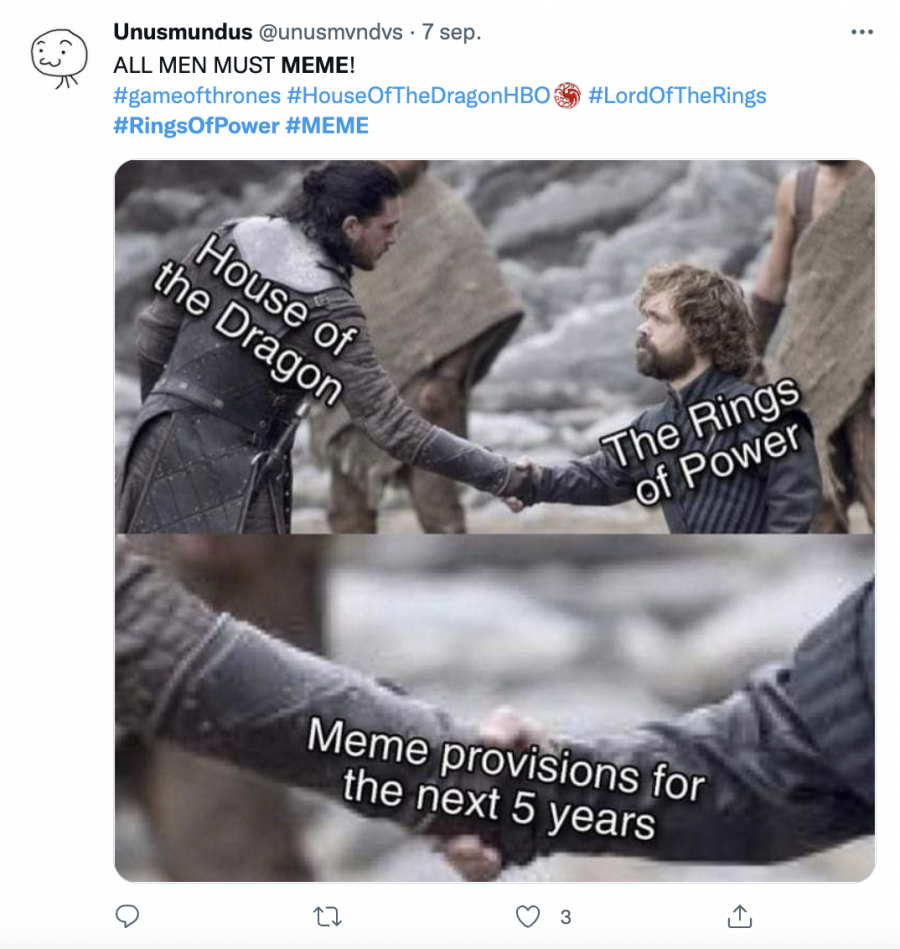
Figure 5: A meme in which Jon Snow and Tyrion Lannister — both characters from the HBO series Game of Thrones — shake hands.
Like Figure 1 already demonstrated, some memes engaged with The Rings of Power's great potential for the creation of memes, which might qualify them at least partially as 'metamemes' — memes about memes. However, both Figure 1 and Figure 5 engage with more than merely memetic content. Figure 5 shows a scene from Game of Thrones, the HBO series of which House of the Dragon is a prequal. In the scene, Jon Snow — who, at that moment in the fictional narrative, is known as the illegitimate son of Ned Stark, one of the great lords of the series — and Tyrion Lannister — a 'dwarf' and the son of Tywin Lannister, another great lord — shake hands. The handshake symbolizes the meeting between two powerful, rivaling families. In the meme, the handshake is entextualized to symbolize the meeting between House of the Dragon and The Rings of Power, which is, like the meeting between House Stark and House Lannister, marked by competition and complex, interwoven relationships.
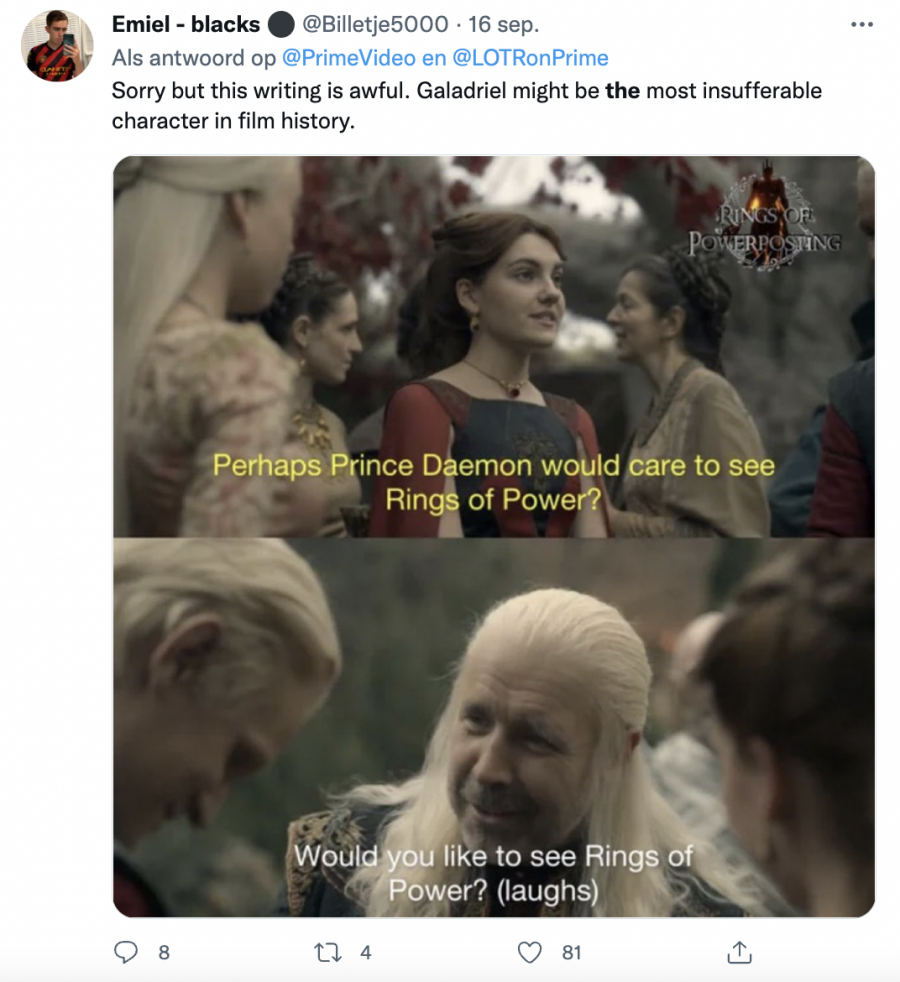
Figure 6: Two images from a scene from the fourth episode of House of the Dragon show how Daemon and Viserys laugh at the suggestion to watch The Rings of Power.
The fact that various other memes reference both The Rings of Power and House of the Dragon appears to confirm the notion that the almost concurrent release of both series indeed provided high fantasy fans with "meme provisions" for a yet to be seen period of time. Though Figure 5 merely requires people to have watched the first season of Game of Thrones and have some basic knowledge of the competition between The Rings of Power and House of the Dragon — as series that play important roles in the struggle for market dominance between Prime Video and HBO Max —, Figure 6 can only be properly understood by people who are engaged with both series.
The images in the meme are taken from a scene of the fourth episode of House of the Dragon. In the scene, Daemon — the rogue brother of the king — has just returned to the capital city, where a conflict about the order of ascension is smouldering in the background. When a conversation between some of the people that are involved in this struggle falls awkwardly silent, the queen suggests Daemon might want to see the royal castle's new tapestries. The king jokingly reiterates her question, unable to contain his laughter, as he obviously believes a warrior like Daemon could never be interested in tapestries. Daemon also perceives the suggestion to be silly, and laughs as well. In the meme, The Rings of Power substitutes the tapestries, thereby showcasing that, like tapestries, The Rings of Power is seen as dumb, insignificant and silly.
Elves taking our jobs as a constructed threat
Less memes were created in response to specific fragments from The Rings of Power, though there was one topic that elicited the creation of some critical content. After the elf Galadriel arrives on the fictional island Númenor — a country that faces various societal issues —, one of its human inhabitants argues that there might be "elf workers taking your trades. Elf workers who don't sleep, don't tire, don't age." Subsequently, the queen that rules Númenor is labeled an "elf lover". One of the memes that was created in response to this scene employs Drakeposting, a type of meme that denotes "preference of one thing over another" (Meming Wiki, n.d.).
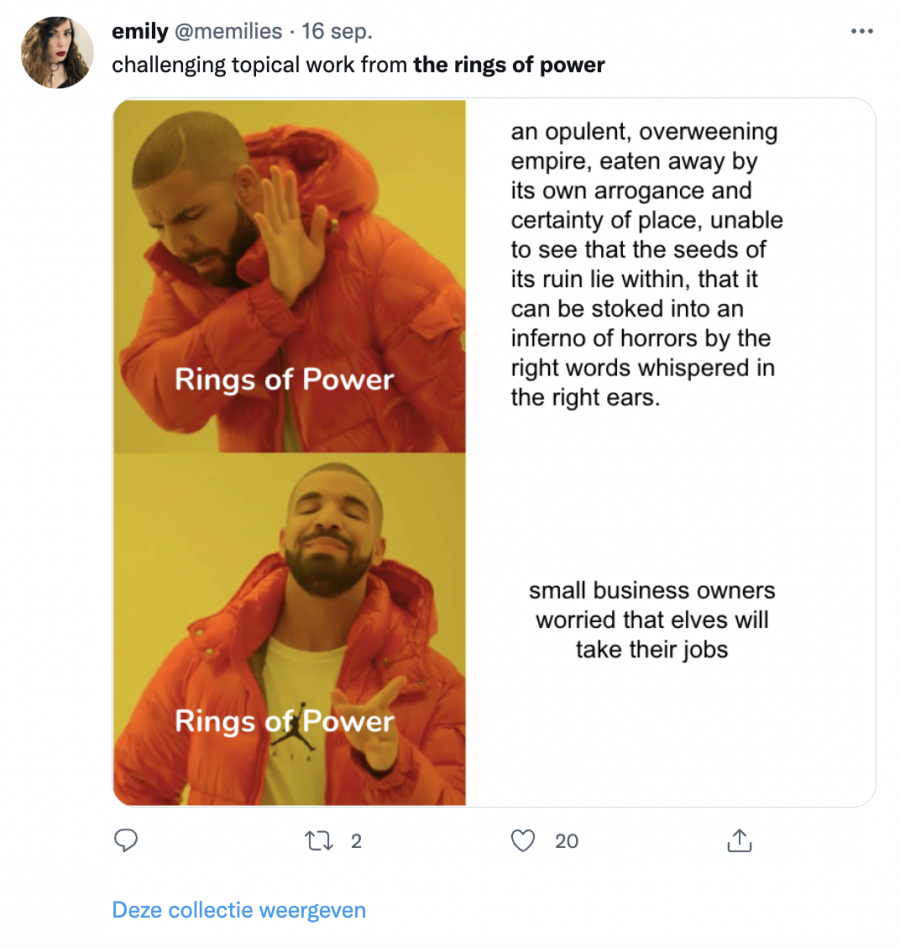
Figure 7: An example of a Drakeposting meme that was created in response to the ideas that elves might take the jobs of humans.
Figure 7 demonstrates how the drake character turns away from "an opulent, overweening empire" in disgust, but makes a gesture of approval towards "small business owners worried that elves will take their jobs". He is labeled "Rings of Power"; probably in reference to the series' creators. In this sense, according to the meme, when the series' creators needed to invent a response for the inhabitants of Númenor to the threats their country is facing, they preferred to display the local tradespeople as feeling threatened by immigrants that might take their jobs, rather than attributing their deteriorating conditions to their nation's arrogance and lack of self-reflectivity.
The Drakeposting-meme is accompanied by the probably ironic notion that the narrative yields "challenging topical work from the rings of power", as the scene seems to allude to familiar anti-immigration discourses. Together, the visual and its texts appear to challenge these discourses, since their combination establishes the "elves will take our jobs" as an oversimplistic response to societal issues that might only be solved through a comprehensive reconfiguration of society. Calling for a transformation of the social order in accordance with critical theory, however, was not the direction the writers of The Rings of Power took, which caused them to endorse immigration and the 'stealing' of jobs as sensible concerns.
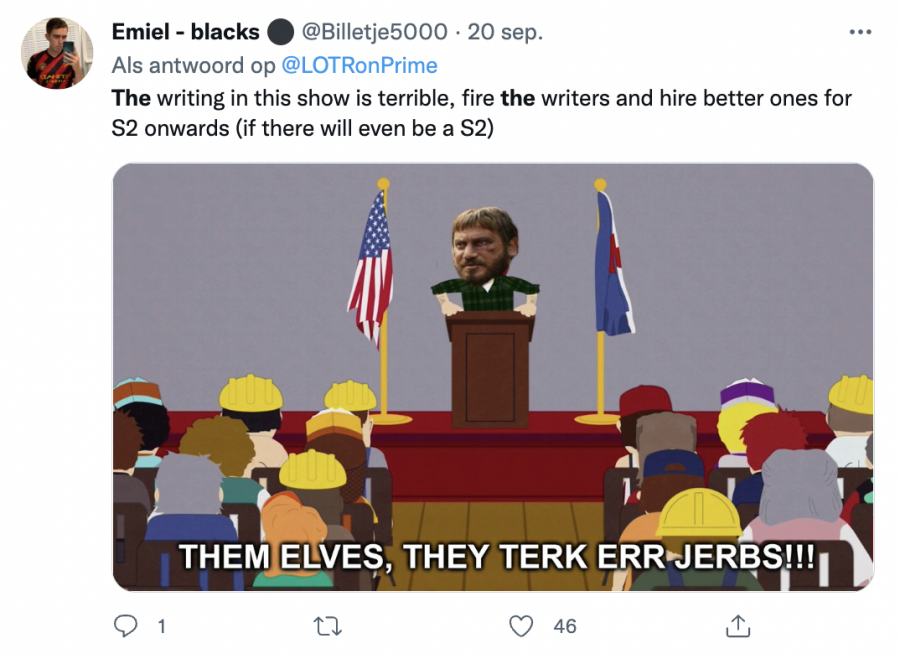
Figure 8: A South Park scene is adapted to incorporate the face of the character from The Rings of Power that argued that Elves will take the trades of humans. His words are transformed to fit the language of South Park.
Figure 8 demonstrates the same perspective as Figure 7. In this particular meme, the Southpark joke "They took our jobs" is used as a meme — the "They took our jobs"-meme — to ridicule the xenophobic attitude that is central to the scene from The Rings of Power. The text that accompanies the meme shows that, just like in Figure 7, the writers are blamed for their transparent incorporation of this discourse.
The Rings of Power and Big Tech capitalism
Though the memes mostly appear to target The Rings of Power and its writers, Bezos' role in the appropriation and transformation of Tolkien's The Lord of the Rings is also addressed by some. Figure 9 utilizes a meme titled "They are the same picture" as its base. The meme arose from a scene from The Office, in which one of employees asks a colleague to describe the differences between two pictures, while being fully aware that the two pictures are identical — it's an office joke. The meme is used to display two things that might differ from each other visually, but should be seen as identical from a substantive perspective.
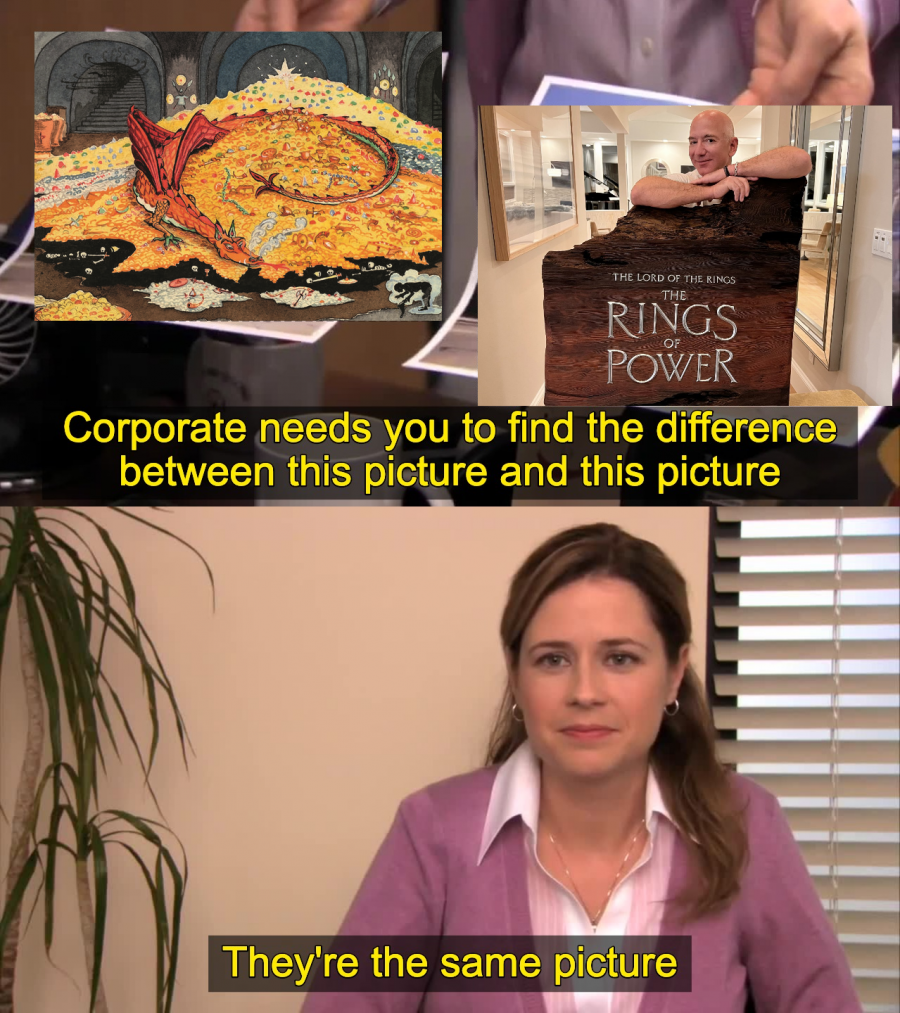
Figure 9: Pam, a character from The Office notes that a drawing of Smaug the dragon and his gold and a picture of Bezos and a poster of The Rings of Power are "the same picture".
This version of the "They are the same picture"-meme shows a drawing of Smaug the dragon and 'his' treasure next to a picture of Bezos leaning on a signboard for The Lord of the Rings: The Rings of Power. Smaug is one of the villians from The Hobbit, another story from The Lord of the Rings universe. In the story, Smaug has violently acquired gold and other belongings from a society of dwarves, and driven them from their ancestral home. Smaug's wrongful ownership of the dwarves' valuables does not serve any practical goals; he merely wants to deny others access to the wealth that is rightfully theirs and keep everything for himself.
The meme indicates that Smaug and Bezos are in essence alike. Similar to Smaug, Bezos also uses his resources to appropriate whatever he desires. Furthermore, he is displayed as 'hoarding' possessions; thus preventing others from benefiting from his wealth. The Lord of the Rings is equated to the dwarves' belongings, thereby demonstrating that it's not only a commodity with financial value, but that it's also valued from a sociocultural perspective. Overall, the meme produces the idea that Bezos' ownership over Tolkien's work should not be accepted as legitimate. As a network of cultural practices, values and artefacts, The Lord of the Rings is displayed as a piece of heritage that is handed down from generation to generation and should therefore not be owned by one all-controlling force.
The absurdity of some fans
It must be noted that despite the fact that explicitly racist Lord of the Rings memes do exist on Twitter — not to mention the memes that contain implicit racism —, they don't appear to receive most of the likes and retweets. The same can be said about memes that explicitely critique what their creators perceive to be 'woke culture'. When the concept was formed, 'woke' was "intrinsically tied to black consciousness and anti-racist struggles" (Cammaerts, 2022, p. 5), but recently, it was "weaponised by the right, deturning it from its initial meaning in the struggle for civil rights into an insult used against anyone who fights fascism, racism and other forms of injustices and discrimination as well as to signify a supposed progressive over-reaction" (Cammaerts, 2022, p. 6). The latter approach is clearly present in some of the memes, revealing their connection with the "New Right" (Maly, 2020).
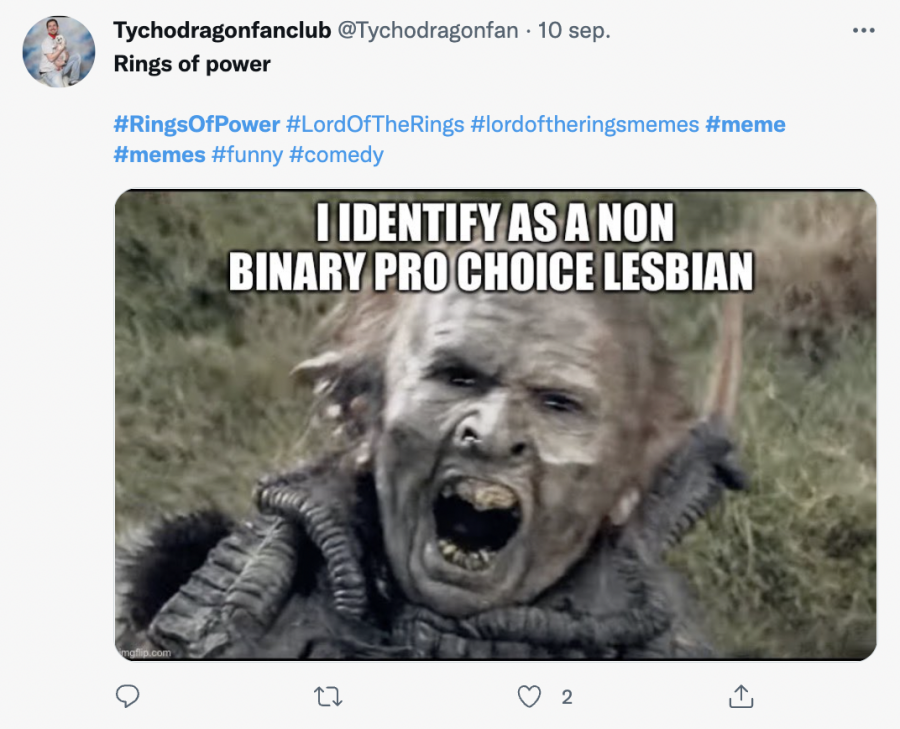
Figure 10: A picture of an orc is transformed into a meme through the addition of a superimposed text.
Figure 10 shows a screenshot of one of the orcs with the superimposed text: "I identify as a non binary pro choice lesbian". A study into memes with these types of texts argues that "memes have become an important way to spread information, identity, and ideology" (Du et al., 2020, p. 162), and that the superimposed text is often "vital to understanding the image" (Du et al., 2020, p. 154) in a particular way. In the case of Figure 10, the act of identifying as a "non binary pro choice lesbian" is ridiculed through its internal exaggeration and its forced connection with the image of the orc — who is, according to the creator of the meme, clearly not a "non binary pro choice lesbian". In this sense, the meme communicates that it is ridiculous for a person to invoke and identity category that does not appear naturally applicable.
The fact that anti-woke discourse is utilized in memes that use visual materials from The Rings of Power, entails that the memes' creators are not merely attempting to communicate something about 'wokeism', but also about the series; arguing that, like individuals in the 'real world', the characters from The Lord of the Rings should not be allowed to experience fluid identities. In this sense, the meme must also be seen as a response to the decision to cast actors of color, which is regarded as 'one bridge too far' by some fans.
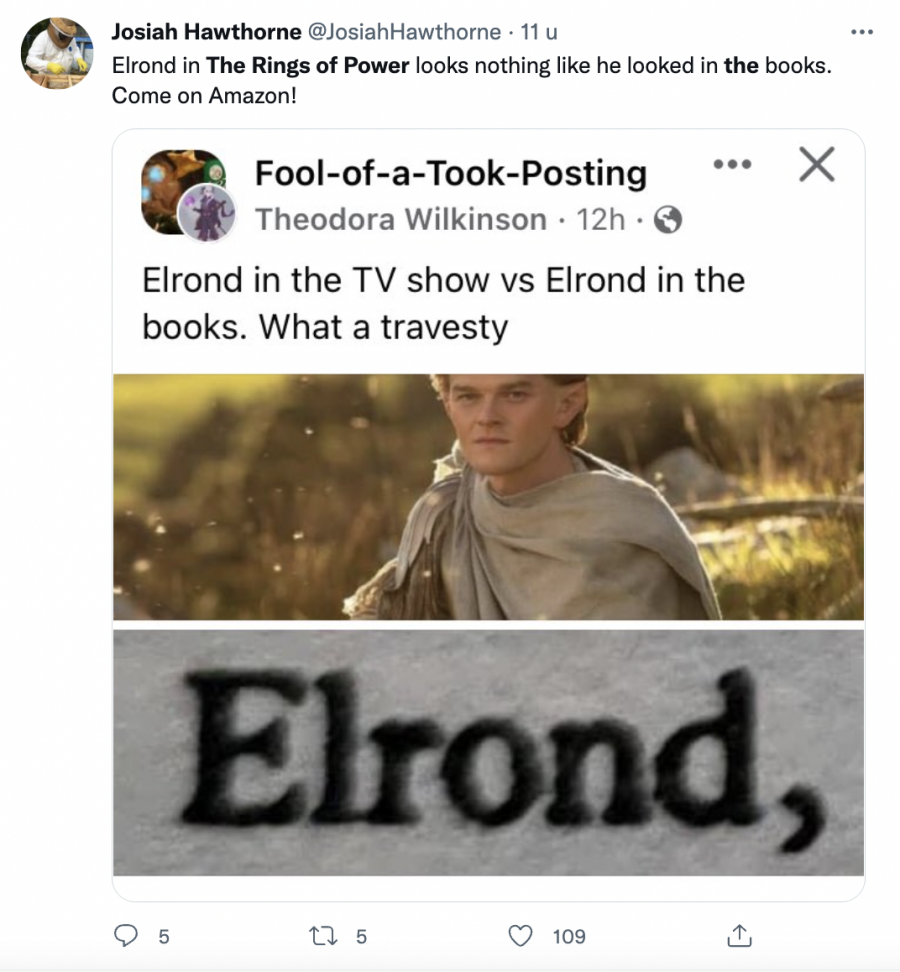
Figure 11: A hyperbole of some of the criticism of the fans that underlines the absurdity of their responses.
Memes utilize and are enabled by various intertextual links (Varis & Blommaert, 2018), always building upon their 'origin meme' while simultaneously indexing other speech events, sometimes even other memes. In Figure 11, it is not the show that is being criticized, but rather the critical attitude of some of the fans, and subsequently the memes these fans (re)produce. The meme shows a picture of the elf Elrond as he appears in The Rings of Power and a picture of Elrond as he appears — literally — in Tolkien's novels; calling the Elrond in the series "a travesty" because he looks nothing like the written 'sign' "Elrond". The meme makes fun of the anger some fans have voiced through exaggeration and deliberate misinterpretation. In doing so, it foregrounds the notion that any visual translation of a written text requires reinterpretations and subsequent resemiotizations; a process in which it is impossible to preserve every aspect of the original piece of discourse. In other words; not being allowed to tamper with Tolkien's works would imply a ban on the creation of any future Lord of the Rings products.
To conclude
Prime Video's The Lord of The Rings: The Rings of Power has certainly generated an impressive range of creative and angry reactions. Though various media have rightfully highlighted the racism and conservatism that imbues many of these responses, an analysis of the memes that were posted between September 1, 2022 and September 21, 2022 demonstrates that there's more to the fans' rejection than meets the eye. The memes display the fans' awareness of potential links between the series' narrative world and the 'real world' and illustrate how the series is not interpreted as a high fantasy story in vacuo, but rather as a node in a complex network of cultural artefacts and practices.
Though the series' diverse cast and its expensive special effects might point to signs of good intentions, these factors, combined with scenes like the "Elves took our jobs"-scene, also seem to demonstrate the shallowness of these intentions. As they focus on controling their ownership over The Lord of the Rings and staying ahead of their competitors, Amazon Prime Video and Bezos appear to have forgotten that cultural artefacts can merely be loved and recognized based on the sociocultural values they carry. And in the case of The Lord of The Rings: The Rings of Power, it often remains unclear what these values might be, besides the series' financial value and its function in Amazon's struggle for market dominance. If Zuckerberg's inability to understand his own nickname and the tech industry's interpretation of The Lord of the Rings in accordance with the values of the American Dream had not already done this, The Rings of Power and the memes that were posted in response to the series should make one thing very clear: Silicon Valley understands Tolkien's work in a very different way than the rest of us.
References
Barone, A. (2022, August 1). What Is the American Dream? Investopedia.
Blommaert, J., & Varis, P. (2011). Enough is enough. Tilburg Papers in Culture Studies.
Bove, T. (2022, April 7). Mark Zuckerberg says Meta employees refer to him as the ‘Eye of Sauron,’ but thinks the nickname comes from a place of love. Fortune.
Cain, R. (2017, November 14). Amazon’s >50M “Lord Of The Rings” Purchase Price Is 1,000 Times What Tolkien First Got For It. Forbes.
Cameron, C. (2022, February 15). LOTR Beard Controversy Explained (How Rings Of Power Breaks Tolkien Lore). ScreenRant.
Cammaerts, B. (2022, May 12). The abnormalisation of social justice: The ‘anti-woke culture war’ discourse in the UK. Discourse & Society, 1–14.
Chafkin, M. (2021, September 21). The Contrarian: Peter Thiel and Silicon Valley’s Pursuit of Power. Van Haren Publishing.
Du, Y., Masood, M. A., & Joseph, K. (2020). Understanding Visual Memes: An Empirical Analysis of Text Superimposed on Memes Shared on Twitter. Proceedings of the Fourteenth International AAAI Conference on Web and Social Media
Flint, J. (2022, September 5). Amazon’s ‘Lord of the Rings: The Rings of Power’ Draws More Than 25 Million Viewers. The Wall Street Journal.
Heritage, S. (2022, September 2). The backlash to rule them all? Every controversy about The Rings of Power so far. The Guardian.
Hetzner, C. (2022, February 19). Jeff Bezos’ new Lord of the Rings show is angering fans because it has Black dwarves. Seriously. Fortune.
Lang, B. (2022, February 11). Lord of the Rings Fans Demand Amazon’s Dwarf Queen Be Given a Beard. CBR.com.
LeCalum. (2022, September 16). Potato Jesus. Know Your Meme.
Lyon, P. (2022, April 15). Stories “The Rings of Power” TV Series Can Tell Based on the Rights They Own. Collider.
Maly, I. (2020, September 28). Metapolitical New Right Influencers: The Case of Brittany Pettibone. Social Sciences.
Meming Wiki. (n.d.). Drakeposting.
Piazza, B. (2022, September 24). Did Amazon Delete “Rings of Power” Reviews? What to Know. Distractify.
Robinson, J. (2022, February 14). Amazon’s ‘The Rings of Power’: 10 Burning Questions. Vanity Fair.
Rodriguez, S. (2020, February 22). Why Silicon Valley is obsessed with “The Lord of the Rings.” CNBC.
Shcherban, E. (2022, September 3). Amazon has shut down access to the “Rings of Power” series rating, and IMDb deletes ratings due to a lot of criticism and negative reviews. gagadget.com.
Shifman, L. (2014, December). The Cultural Logic of Photo-Based Meme Genres. Journal of Visual Culture, 13(3), 340–358.
Tassi, P. (2022, September 5). “Rings Of Power” Is Getting Review Bombed So Hard Amazon Suspended Reviews Entirely. Forbes.
Varis, P., & Blommaert, J. (2018, November 7). Conviviality and collectives on social media: Virality, memes, and new social structures. Multilingual Margins: A Journal of Multilingualism From the Periphery, 2(1), 31.
Wexner, D. (2018, August 4). The hidden logic of Peter Thiel’s “Lord of the Rings”-inspired company names. Quartz.
What Is the American Dream? (2022, August 1). Investopedia.